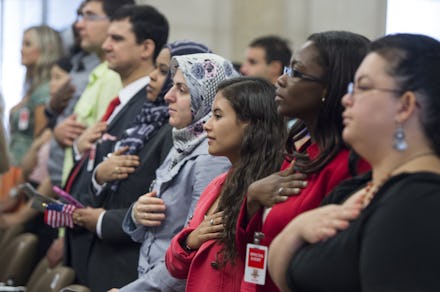Here's Why It's Perfectly Fine to Recite the Pledge of Allegiance in Arabic

Americans speak English. Americans speak Spanish. Americans speak Lakota, Navajo and Paiute. To the chagrin of many, Americans even speak Arabic — a fact that, in some circles, is still met with resistance and hostility.
Take what happened Wednesday in Pine Bush, New York. During a celebration for National Foreign Language week, Pine Bush High School senior class president Andrew Zink, who reads the school's morning announcements, let a fellow student recite the Pledge of Allegiance in Arabic over the loudspeaker, according to NBC News.
This should not have been controversial. Arabic is spoken by nearly a million Americans in their homes — more than American speakers of Japanese, Hebrew and Armenian combined. But someone had a problem with it: Zink was swiftly relieved of his morning announcement duties and reportedly wasn't even told why.
It was later revealed that Superintendent Joan Carbone had received complaints from Pine Bush residents and students about the recitation. According to the Times Herald-Record, the use of Arabic offended some of the hamlet's Jewish residents, along with others who'd lost family fighting overseas in Afghanistan.
Afghanistan. Why? Perhaps the complainants had trouble discerning between adults at war and kids reciting the Pledge of Allegiance in a classroom. Maybe they didn't realize that Afghans don't even speak Arabic. The official languages are Dari and Pashto, which are spoken by a combined 85% of the population.
But clearly, there's more going on here. A similar logic was employed when plans were announced to build a mosque and interfaith center in lower Manhattan, New York, near the former World Trade Center. Predictably, Fox News railed against the decision. The Boston Globe's Jeff Jacoby wrote that it was "a gross insult to the memory of those who were killed" during 9/11. Their reactions also fall into a broader pattern of Americans attributing to all Muslims the actions of a small minority.
This is a problem. Somewhere along the way, we've managed to conflate Arabic with Afghanistan, Islam with terrorism, and all four with an ethos that's distinctly un-American. None of it makes sense. Some Americans speak Arabic, some Americans are Muslims, some are terrorists and some are Afghans. In many cases, none of these categories overlap. And in no case do any of them preclude being American.
So, a friendly reminder: 381 languages are spoken in the United States. At least five major religions are practiced, with anywhere from five to 10 sub-sects apiece. All of them are American. All of them are valid. And despite any rule that says the Pledge of Allegiance must be recited in English, or any backlash from students, parents or the broader Pine Bush community, one fact remains:
A pledge in Arabic means the same thing as a pledge in English. To presume otherwise is a mistake.